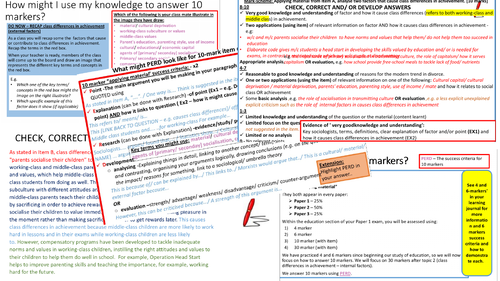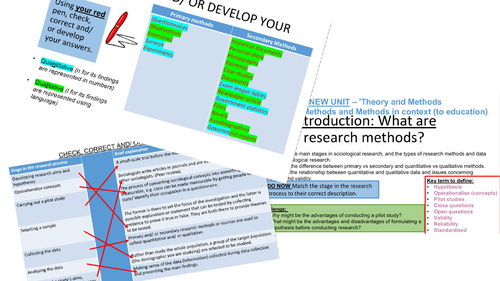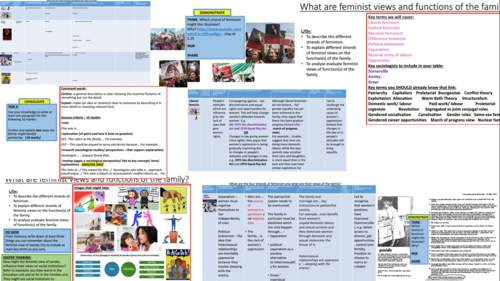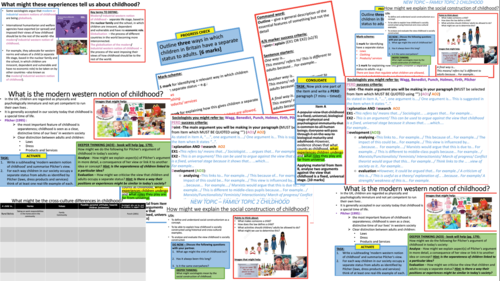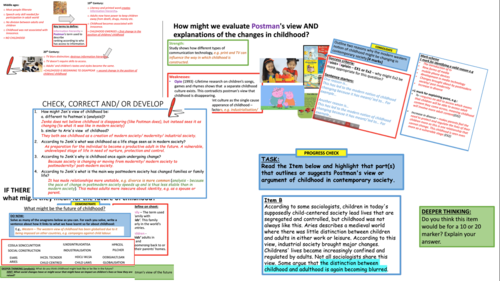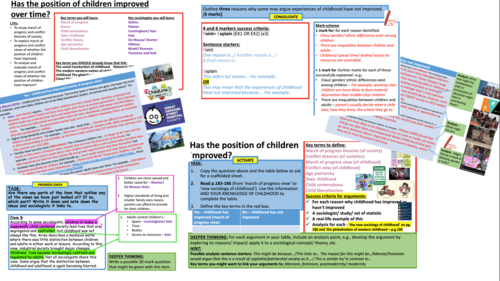
179Uploads
23k+Views
5k+Downloads
All resources

How to answer 10 markers for Sociology Education Class differences in achievement (external factors)
Detailed and differentiated (up and down), student led lesson that explores how to answer 10 markers, in particular for education topic 1 - class differences in achievement (external factors). Can also be used as a revision lesson for topic 1 (class diff in achievement -external factors) Includes student friendly success criteria PERD (Point+Explanation+Research+Develop) success criteria and student-friendly mark-scheme.
ANSWERS TO MAIN ACTIVITIES AND EXAM QUESTIONS ARE INCLUDED
**Made for AQA A-level but can be easily used for other specs (just need a different source of information/ textbook) differentiated down for GCSE) lesson **

Sociology Research Methods - Introduction to research methods
Detailed and differentiated student-led lesson that explores primary vs secondary methods, quantitative vs qualitative methods, validity and reliability as a way to introduce students to the main main research methods. LESSON COMES WITH ANSWERS
Can be used for ANY SPEC and GCSE but catered towards A-LEVEL AQA sociology** .
Comes with key term sheet for the lesson.

Introduction to Yr 13 Sociology
Introduction lessons that outlines the AQA A-level course, expectations, revision resources and guidance. Rest of lessons enables students to recap the AOs, ways they might develop and/ or demonstrate in. Students are directed to create AO specific goals and action plans to meet each. Lesson also teaches students how to highlight with purpose. Comes with worksheet and ANSWERS for activities.
Can be differentiated down for GCSE and can be edited to make applicable for ANY SPEC.

AQA A-Level Sociology PLCs (ALL UNITS) - EDITABLE
NOW EDITABLE - on a word document
Personal Learning Checklists for the following AQA A-level Sociology syllabus:
Education
Family
Religion
Media
Crime
Theory and Methods (includes separate PLCs for each sub-topic and a combined PLC.
Methods in context

AQA Sociology Crime and Deviance Workbooks: Topics 1-7
Workbooks for the AQA A-level Sociology Crime and Deviance unit. The workbooks cover topics 1-7 and should be used with the Webb, Westergaard, Trobe and Townend Book 2. The workbooks are made up of comprehension questions to help students engage with the content. Students would be expected to answer the quetsions in the booklet whilst reading the textbook. The workbooks enable students to engage with key terms by using the glossary at the back of the textbook. Workbooks also include some challenge questions that allow students to make links to other topics in the unit and course.

AQA A-level Sociology Families: Theories of the family – Feminist views of the family (UPDATED))
Detailed and differentiated (up and down) student-led lesson that examines and evaluates Liberal (Somerville), Radical (Greer), Marxist (Ansley) and Difference feminist views and functions of the family.
Lesson explores the concepts: Political lesbianism , Separatism, Reserve army of labour, Oppression
Lesson makes links to general feminist key terms and other key terms that students might have previously been taught, e.g. Patriarchy, Capitalism, Proletariat, Bourgeoisie, Conflict theory, Exploitation, Alienation, Gendered socialisation Canalisation Gender roles, Warm Bath Theory, Structuralism, etc.
Main activity makes reference to AQA A-level Book 1 by Townsend
***** ALL ANSWERS INCLUDING ANAYSIS FOR TABLE ACTIVITY NOW INCLUDED ****
NOW INCLUDES MODEL PARAGRAPH FOR 10 MARKER
***** WORKSHEETS AT THE END OF THE PPT****

A-level AQA Families Topic 2 Childhood- Social construction of childhood
Detailed and differentiated student-led lesson that explores childhood, social constructionism, industrialisation (briefly), the globalisation of western childhood , western notion of childhood as a way to introduce students to the idea of the social construction of childhood. Mostly focusses on cross-cultural differences in childhood but briefly covers historical differences of childhood in Britain.
Explores the views of sociologists such as Pilcher, Benedict, Wagg, Punch, Holmes, Firth and Malinowski.
AQA A-level Families Topic 2 Childhood- Lesson 1
One of the activities require pages from the AQA A Level Sociology Book One Including AS Level: Book one 3rd Revised edition by Rob Webb, Hal Westergaard, Keith Trobe, Annie Townend
RESOURCES CAN BE FOUND AT THE END OF PPT
ANSWERS INCLUDED FOR SOME ACTIVITIES
INCLUDES EXAMS QUESTIONS

A-level AQA Families Topic 2 Childhood– The future of childhood
Detailed and differentiated student-led lesson that explores Information hierarchy , Postmodernity/ postmodern society/ contemporary society, Modernity/ modern society/ industrial society, Accordion family, Boomerang children as a way to examine the changes to the modern western notion of childhood in contemporary society. Covers the views of Postman and Jenks.
Activities require pages from the AQA A Level Sociology Book One Including AS Level: Book one 3rd Revised edition by Rob Webb, Hal Westergaard, Keith Trobe, Annie Townend
RESOURCES CAN BE FOUND AT THE END OF PPT
ANSWERS INCLUDED FOR MAIN ACTIVITIES
**INCLUDES EXAM QUESTIONS **

A-level AQA Families Topic 2 Childhood- Has the position of children improved over time?
Detailed and differentiated student-led lesson that explores march of progress theory, Toxic childhood, Conflict theory, Age patriarchy, Child liberationism as a way to examine the different views (march of progress and conflict views) of whether childhood has improved over time. Includes views of Gittins, Palmer, Firestone and Holt, Aries etc.
Main activity requires pages from the AQA A Level Sociology Book One Including AS Level: Book one 3rd Revised edition by Rob Webb, Hal Westergaard, Keith Trobe, Annie Townend
ANSWERS INCLUDED FOR MAIN ACTIVIES
RESOURCES CAN BE FOUND AT THE END OF PPT

KEY SOCIOLOGIST SHEET - AQA A-level Sociology Education: Topic 3 Ethnic differences in achievement
Alphabetical list of sociologists who attempt to explain ethnic differences in achievement. SOME scaffolding with some sentence starters, prompts to help students with what some sociologists might says and put into external vs internal factors categories .
Requires students to write done what key sociologists from the topic ethnic differences in achievement (external and internal factors).
Good form of revision and revision resource for the students.
**BASED ON CONTENT in textbook - AQA A Level Sociology Book One Including AS Level: Book one 3rd Revised edition by Rob Webb, Hal Westergaard, Keith Trobe, Annie Townend ’ textbook

GCSE Sociology - How might sociologists explain behavior?
Explores, norms, values, culture, socialisation (primary/secondary) and social control, agencies and agents of socialisation and social control as an introduction to Sociology.
Also looks at the importance of primary socialisation and the consequences of it inadequately performed.
3 marker with a success criteria and student friendly mark-scheme
Resources can be found at the end of the PPT.
Answers included for main activities
Made to meet the AQA spec but can be used (and edited if needed for other spec)
Bundle

GCSE Sociology - INTRO LESSONS, QUIZ & KEY TERM SHEET
Detailed and differentiated (up and down) student-led lessons that help students to develop their knowledge and understanding from previous lesson(s). Includes 6 lessons (the last being a quiz lesson) and a key term sheet that covers the key terms in these lessons:
**L1 – Intro to GCSE AQA Sociology: **
an overview of the course, exam and curriculum
An activity on how to create and maintain a safe space for discussions
suggested revision websites and youtube channels that students can use to develop their knowledge and understanding of key ideas and concepts.
activities to introduce students to Sociology and sociological thinking/ inquiry.
Expectations
L2 – How might sociologists explain behavior?
Explores, norms, values, socialisation (primary/secondary) and social control, agencies and agents of socialisation and social control as an introduction to Sociology.
Also looks at the importance of primary socialisation and the consequences of it inadequately performed.
3 marker with a success criteria and student friendly mark-scheme
L3 – Intro to functionalism
Explores value consensus, social order, biological/ organic analogy, structuralism, consensus theories and social cohesion as way of introducing students to the key main functionalist views and ideas.
3 marker with a success criteria and student friendly mark-scheme
L4 – Intro to Marxism
explores capitalism, profit, social class, ownership, interests, structuralism, conflict theories, exploitation, false consciousness and social relations of production as a way to introduce students to the main Marxist views and ideas.
**L5 – Intro to feminism **
explores sex, gender, gender roles, patriarchy, gender inequality as a way to introduce students to the main feminist views of society and ideas.
3 marker with a success criteria and student friendly mark-scheme
**L6 – Quiz lesson **
small revision activity –that looks at the similarities and differences between functionalism, Marxism and feminism
25 min quiz (on basic sociological concepts, key functionalist, Marxist, feminist’s ideas and terminology)
answers/ mark-scheme for quiz
scaffolding for students to peer assess (but quiz can also be marked by teacher)
SAME as A-level intro quiz but excludes questions on the nature – nurture debate.
Can be edited to meet the needs of any spec – key terms in L2-5 meet the AQA spec
Answers included for main activities and quiz
L2,3 & 5 include 3 marker, success criteria to answer this and student-friendly mark-scheme for self and/ or peer-assessment.
Bundle

AQA GCSE Sociology - Research Methods: Intro lessons
L1 - How do sociologisrs collect their data?
Detailed lesson with lots of scaffolding based on adaptive teaching that help students understand how sociologist collect data for sociological research (e.g. difference between primary and secondary methods, quantitative and qualitative data.
Covers the following key terms: research methods, sociological research, data, research process, Primary methods vs Secondary Methods, qualitative vs quantitative data, closed vs open questions, validity and reliability.
L2 - How do sociologists begin their research?
Detailed lesson with lots of scaffolding based on adaptive teaching that help students understand how sociologists begin their research (e.g. what is meant by research design, hypothesis, research questions, aims , pilot study, the first two stages of research process and assessing its usefulness.
Covers the following key terms: Research design, Hypothesis, Research questions, Research aims and Pilot study
Makes links to key terms that students should have already covered the following key terms: Respondent, Response rate, Participants, Sociological research, Research process and Data
Answers to all activities included
L3 - How might sociologists collect their sample?
Detailed lesson with lots of scaffolding based on adaptive teaching that help students understand how might sociologist select their sample for sociological research (e.g. the sampling method, consequences sampling methods may have on social research, the different types of sampling methods and how they are used.
Covers the following key terms: Target population, Sample, Sampling frame, Probability (or random sampling) vs Non-probability sampling, Simple random sampling, Systematic random sampling, Stratified random sampling, Snowball sampling, Quota sampling, Representative sample vs unrepresentative sample, Generalise; Generalisability; To make generalisations, Opportunity sampling extension), Cluster sampling (extension) and Positivists vs interpretvivists (extension)
Answers to most activities are included
L4 - What PET issues might sociologists need to consider when conducting research?
Detailed lesson with lots of scaffolding based on adaptive teaching that help students understand what are PET issues that sociologists consider when designing and conducting research (e.g. define and identify possible practical, ethical and theoretical (PET) advantages and disadvantages of social research and explaining PET’s differences
Covers the following key terms: Practical issue, Ethical issues, Theoretical issues,Anonymity, Confidentiality , Informed consent, Covert research (extension), Pseudonym (extension), Mixed method (extension) Findings (of research) (extension).
Key bodies, laws and theories we will cover: British Sociological Association, Data Protection Act 1998, Positivism, Interpretivism
Answers to most main activities are included
RESOURCES FOR ALL LESSONS CAN BE FOUND AT THE END OF THE PPT IF NOT INCLUDED AS A SEPARATE DOCUMENT.

AQA GCSE Sociology - Research Methods: How might sociologist select their sample?
Detailed lesson with lots of scaffolding based on adaptive teaching that help students understand how might sociologist select their sample for sociological research (e.g. the sampling method, consequences sampling methods may have on social research, the different types of sampling methods and how they are used.
Covers the following key terms: Target population, Sample, Sampling frame, Probability (or random sampling) vs Non-probability sampling, Simple random sampling, Systematic random sampling, Stratified random sampling, Snowball sampling, Quota sampling, Representative sample vs unrepresentative sample, Generalise; Generalisability; To make generalisations, Opportunity sampling extension), Cluster sampling (extension) and Positivists vs interpretvivists (extension)
Answers to most activities are included

AQA GCSE Sociology Different family structures introduction
Detailed lessons with lots of scaffolding based on adaptive teaching that help students understand different family structures
Covers the following key terms: family, cohabitation, household, family form, family diversity, nuclear family,lone-parent family, same-sex family, reconstituted family, extended family and empty-nest family.
Answers to main activities are included
Students should know the following key terms prior to reading: contemporary society, homosexuality, heterosexuality
Resources can be found at the end of the PPT
Made to meet the AQA spec but can be used (and edited if needed) for other exam boards.

AQA GCSE Sociology - Research Methods: How do sociologists begin their research?
Detailed lesson with lots of scaffolding based on adaptive teaching that help students understand how sociologists begin their research (e.g. what is meant by research design, hypothesis, research questions, aims , pilot study, the first two stages of research process and assessing its usefulness.
Covers the following key terms: Research design, Hypothesis, Research questions, Research aims and Pilot study
Makes links to key terms that students should have already covered the following key terms: Respondent, Response rate, Participants, Sociological research, Research process and Data
Answers to all activities included
resources can be found at the end of the PPT

AQA GCSE Sociology - Education: Alternative forms of education
Detailed lesson with lots of scaffolding based on adaptive teaching that help students understand alternative forms of traditional education (e.g. describe the alternative forms of educational provision, explain how the different forms of educational provision differ to traditional forms of education, analyse and evaluate the alternative forms of educational provision.
Covers the following key terms: Home education/ home-schooling, Democratic education/ de-schooling, Vocational education and training
Key sociologists mentioned that students should already be aware of: Illich (extension)
Answers to all main activities included
Resources can be found at the end of the PPT

AQA GCSE Sociology: Family - Theories of divorce
Includes a ‘teaching to all’ activity that enables students to recap functionalist, Marxist and feminist views of society so that they can better understand their views on divorce.
Includes a 4 marker with scaffolding to help students answer it. Also includes a annotated 4 marker mark-scheme for self and peer-assessment and to enable students to understand how examiners will mark their 4 marker.
ANSWERS TO ALL ACTIVITIES INCLUDED

AQA GCSE Sociology: Family - Changing family patterns
Explores the patterns of the following: reconstituted families, one-person households, dual career families, fertility and childbearing, lone-parent, same-sex couples, extended families and cohabitation.
Starter activity allows students to go through a model 12 mark answer on divorce
Provides and activity to develop students ability to read and interpret exam items.
ANSWERS TO SOME ACTIVITIES INCLUDED
RESOURCES CAN BE FOUND AT THE END OF THE PPT
Includes a key term and definition sheet for the lesson (new key terms and makes links to key terms students should have previously learnt that link to this lesson).

AQA GCSE Sociology Education - Education policy before 1988
Detailed lesson with lots of scaffolding based on adaptive teaching that help students understand Education reforms before 1988 (e.g. The main educational policies before 1988, the impact of educational policies before 1988, how to apply sociological perspectives to educational policies and evaluate them).
Cover the following key terms:
Education policy
Education reform
The tripartite system
Secondary modern
Comprehensive system
Secondary moderns
State-run schools
Eleven- plus exam
Compulsory [state] education
Selective schools
ANSWERS TO ALL MAIN ACTIVITIES INCLUDED .
Key terms students should know:
Grammar vs comprehensive schools , Academies/ free schools,
State-run education/ schools, Working-class subculture, Culture Norms, values, setting Mixed-ability classes, Banding Local Education Authority (LEA), Independent/ private schools
RESOURCES CAN BE FOUND AT THE END OF PPT

